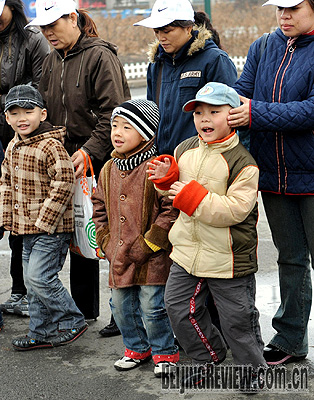|

IN NEED OF CARE: Autistic children and their parents in Changchun, capital of Jilin Province, play games on the first World Autism Awareness Day, organised to raise public awareness of the mental handicap
University English teacher Tian Huiping, a career woman with a child, was living an ideal life in the eyes of many women, when in 1989 her family was shaken by the news that her son had autism.
The diagnosis meant a life of developmental disability that will prevent the two-and-a-half-year-old boy from properly understanding what he sees, hears, and otherwise senses.
In her despair and confusion Tian initially thought about committing suicide. It took her two years to come to terms with the situation and dispel all thoughts of suicide.
A severe form of psychopathology evident before the age of three, autism was first put forward by American psychiatrist Leo Kanner in 1943. It is a developmental disorder that knows no boundary in nationality, gender, race or social status, and that cannot be cured. Medical treatment can only relieve symptoms.
Children with autism face great difficulty in learning normal patterns of speech and communication and appropriate ways to relate to people, objects and events. The autistic child has no reaction to sound, no reaction to pain, and no recognition of genuine danger. They seem to "tune out" the world around them.
April 2 of this year is the first World Autism Awareness Day, approved by UN, to raise international awareness of the importance of early diagnosis and treatment of autism. UN statistics reveal that the brain disorder has been estimated to affect 35 million people worldwide, equivalent to a new diagnosis of autism every 20 minutes.
Research
In 1993, Tian opened the first Chinese institute to educate parents of autistic children on how to communicate with them. Before this, there was no help for autistic children or their parents in China and only a handful of doctors had diagnosed autism since Professor Tao Guotai in Nanjing diagnosed the first case in China in 1982.
There have been authoritative statistics on China's autism sufferers. A research report on Chinese autistic children published by the Social Policy Research Center of the Chinese Academy of Social Sciences in April pointed out that according to the internationally acknowledged autism occurrence rate of four cases in every 1,000 people, the autistic population in China is around 5.23 million, the largest national population in the world.
In 2001, China's Disabled Persons' Association, the Ministry of Health and the Ministry of Public Security conducted a joint national survey on handicapped children. The survey concluded that China's mentally handicapped children between zero and six years old totaled around 104,000, with an annual increase of 15,000 children; autism was the primary mental handicap among Chinese children.
Jia Meixiang, a psychiatrist from the Institute of Mental Health of Peking University and an expert on autism, said that the public has a limited knowledge of autism, so a large proportion of patients remain undiagnosed.
Autism therapy was first introduced to China at the beginning of the 1990s by private organizations. Noteworthy is that most of these private organizations, like Tian's institute, were opened by the parents of autistic children.
China's research institutes and education organizations for autistic children mainly use translated overseas textbooks. Jia said the lack of unified textbooks, unified therapist training organizations and statistics on autistic children has limited the scale of the therapy market.
Right to education
"Autistic patients need not only medical therapy, but also help from people around them and respect from society," said Tian. As the mother of an autistic child, she has a deep understanding of the needs of autistic children.
| 